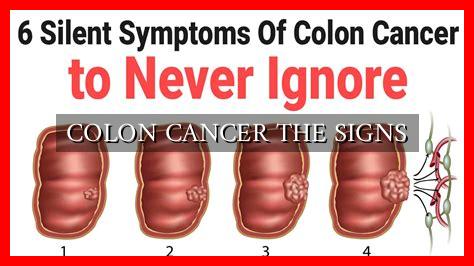-
Table of Contents
Colon Cancer: The Signs
Colon cancer, also known as colorectal cancer, is a type of cancer that starts in the colon or rectum. It is the third most common cancer diagnosed in both men and women in the United States. Early detection is crucial for successful treatment, so it is important to be aware of the signs and symptoms of colon cancer.
Common Signs of Colon Cancer
Colon cancer often does not cause symptoms in its early stages, which is why regular screenings are recommended for individuals over the age of 50. However, as the cancer progresses, the following signs may appear:
- Changes in bowel habits, such as diarrhea, constipation, or narrowing of the stool
- Blood in the stool or rectal bleeding
- Abdominal discomfort, such as cramps, gas, or pain
- Unexplained weight loss
- Fatigue or weakness
Importance of Early Detection
Early detection of colon cancer significantly increases the chances of successful treatment. According to the American Cancer Society, the five-year survival rate for localized colon cancer is 90%.
. However, if the cancer has spread to distant organs, the survival rate drops to just 14%.
Screening tests, such as colonoscopies, can help detect colon cancer in its early stages when it is most treatable. It is recommended that individuals at average risk for colon cancer begin screening at age 45 or 50, depending on the guidelines of their healthcare provider.
Case Study: John’s Story
John, a 55-year-old man, experienced changes in his bowel habits and abdominal discomfort. Initially, he dismissed these symptoms as a result of stress or a poor diet. However, when the symptoms persisted, he decided to see his doctor.
After undergoing a colonoscopy, John was diagnosed with stage II colon cancer. He underwent surgery to remove the tumor and received chemotherapy. Thanks to early detection, John’s cancer was successfully treated, and he is now cancer-free.
Conclusion
Colon cancer is a serious disease that can be effectively treated if detected early. Being aware of the signs and symptoms of colon cancer is crucial for early detection and successful treatment. If you experience any of the signs mentioned above, it is important to consult with your healthcare provider promptly.
Remember, regular screenings can save lives. Don’t wait until it’s too late. Take charge of your health and schedule a screening for colon cancer today.
For more information on colon cancer and screening guidelines, visit the American Cancer Society website.


